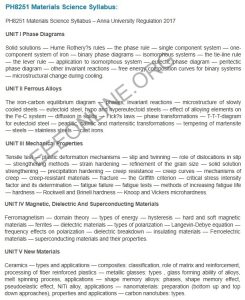PH8251 Materials Science Syllabus:
PH8251 Materials Science Syllabus – Anna University Regulation 2017
UNIT I Phase Diagrams
Solid solutions — Hume Rothery?s rules — the phase rule — single component system — one-component system of iron — binary phase diagrams — isomorphous systems — the tie-line rule — the lever rule — application to isomorphous system — eutectic phase diagram — peritectic phase diagram — other invariant reactions — free energy composition curves for binary systems — microstructural change during cooling.
UNIT II Ferrous Alloys
The iron-carbon equilibrium diagram — phases, invariant reactions — microstructure of slowly cooled steels — eutectoid steel, hypo and hypereutectoid steels — effect of alloying elements on the Fe-C system — diffusion in solids — Fick?s laws — phase transformations — T-T-T-diagram for eutectoid steel — pearlitic, baintic and martensitic transformations — tempering of martensite — steels — stainless steels — cast irons.
UNIT III Mechanical Properties
Tensile test — plastic deformation mechanisms — slip and twinning — role of dislocations in slip — strengthening methods — strain hardening — refinement of the grain size — solid solution strengthening — precipitation hardening — creep resistance — creep curves — mechanisms of creep — creep-resistant materials — fracture — the Griffith criterion — critical stress intensity factor and its determination — fatigue failure — fatigue tests — methods of increasing fatigue life — hardness — Rockwell and Brinell hardness — Knoop and Vickers microhardness.
UNIT IV Magnetic, Dielectric And Superconducting Materials
Ferromagnetism — domain theory — types of energy — hysteresis — hard and soft magnetic materials — ferrites — dielectric materials — types of polarization — Langevin-Debye equation — frequency effects on polarization — dielectric breakdown — insulating materials — Ferroelectric materials — superconducting materials and their properties.
UNIT V New Materials
Ceramics — types and applications — composites: classification, role of matrix and reinforcement, processing of fiber reinforced plastics — metallic glasses: types , glass forming ability of alloys, melt spinning process, applications — shape memory alloys: phases, shape memory effect, pseudoelastic effect, NiTi alloy, applications — nanomaterials: preparation (bottom up and top down approaches), properties and applications — carbon nanotubes: types.

